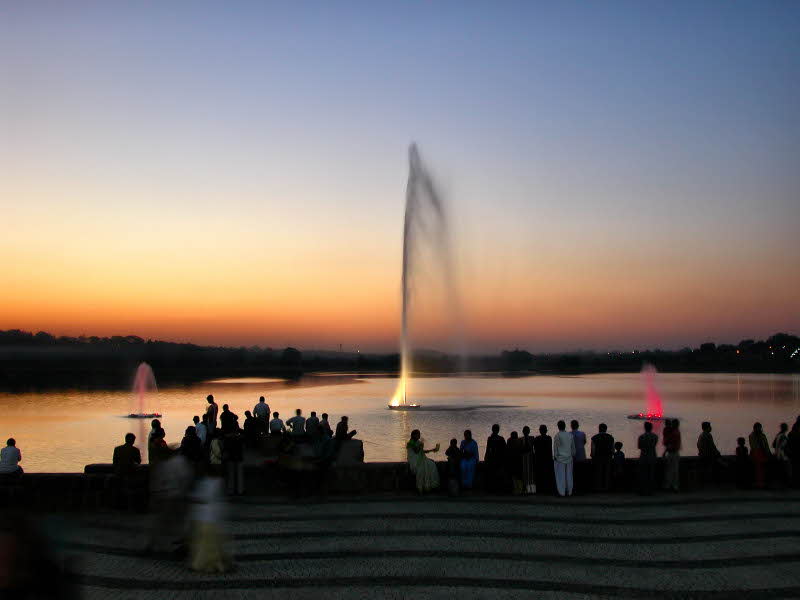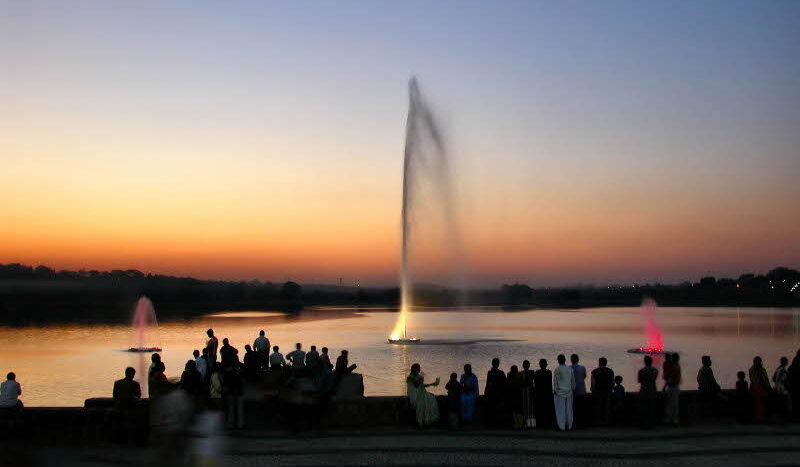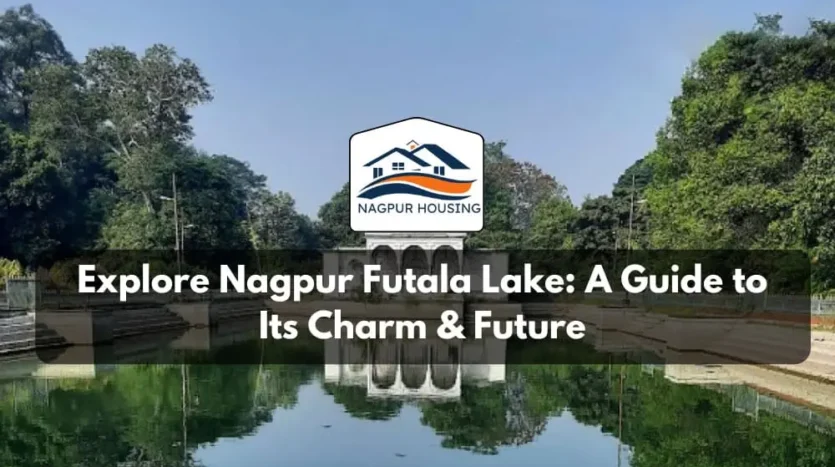Explore Nagpur Futala Lake: A Guide to Its Charm & Future
Nestled in the heart of Nagpur, Maharashtra, Nagpur Futala Lake is more than just a water body—it’s a vibrant slice of the city’s heritage, a go-to spot for relaxation, and a symbol of Nagpur’s evolving urban landscape. Known locally as Telankhedi Lake, this 60-acre gem has been a part of Nagpur’s identity for over two centuries. Whether you’re a local looking for a peaceful evening stroll, a tourist eager to soak in the city’s culture, or someone eyeing real estate opportunities in the area, Futala Lake has something for everyone.
In this blog post, we’ll dive into the rich history, modern amenities, property market, quick facts, and ongoing expansion plans that make Nagpur Futala Lake. A must-visit destination and a hotspot in the city.
You might like: Ambazari Lake Nagpur: History, Amenities & Property Guide
About Nagpur Futala Lake: A Historical Gem
Futala Lake’s story begins in the late 18th century. During the reign of the Bhonsle dynasty, a prominent Maratha clan that ruled Nagpur. Constructed around 1799 by the Bhonsle kings, the lake was originally designed as a reservoir to supply water to the Telangkhedi Garden and meet the city’s growing needs. Spanning 60 acres, it was a strategic marvel, surrounded by lush forests on three sides and a landscaped beach on the fourth, offering both utility and natural beauty. The Bhonsles, known for their contributions to the Maratha Empire, left behind a legacy that continues to define Nagpur’s cultural and historical fabric.
During the British colonial period, the lake’s role shifted. After the Bhonsle kingdom was annexed in 1853 under the Doctrine of Lapse, the British prioritized commercial and administrative efficiency over maintaining water bodies. Infrastructure projects, like railway construction, disrupted the lake’s natural water flow, leading to ecological challenges. By the 1980s, Futala Lake faced severe droughts, even drying up completely at one point, taking two years to refill naturally. This period marked a low point, with the lake reduced to a cattle-washing site due to neglect.
However, the early 2000s brought a revival. In 2003, the Nagpur Improvement Trust (NIT), with state government support, launched a ₹4.5 crore beautification project. The initiative included desilting, removing invasive aquatic plants like lotus and water hyacinth, and rebuilding the eastern guard wall. Pathways were paved with granite, roads were widened, and decorative elements like benches, lamps, and dustbins were added, transforming Futala Lake into a vibrant recreational hub. Today, it stands as a testament to Nagpur’s commitment to preserving its heritage while embracing modernity.
Amenities at Nagpur Futala Lake: A Hub for Recreation

Futala Lake is more than just a pretty view—it’s a lively destination packed with amenities that cater to families, couples, friends, and solo visitors. Here’s a rundown of what you can expect:
- Musical Fountain Show: The lake’s star attraction is its colorful, synchronized fountain show, often compared to world-class displays. Named after the legendary Lata Mangeshkar, the fountains dance to a mix of Hindi, Marathi, and English songs, accompanied by vibrant lights. The show, which runs on a trial basis for select events, is a must-see, especially during the evening hours from 7 PM to 9 PM. Tickets are priced around ₹250, though availability for the general public is limited.
- Boating Adventures: Whether you’re in the mood for a leisurely pedal boat ride or a thrilling motorboat experience, boating at Futala Lake is a crowd favorite. It’s perfect for families or couples looking to enjoy the serene waters against the backdrop of lush greenery.
- Food and Culinary Delights: The lakeside is a foodie’s paradise, with a bustling chowpatty lined with stalls serving Nagpur’s iconic street food—think spicy bhel puri, crispy pani puri, roasted bhutta (corn), and refreshing coconut water. For a more formal dining experience, nearby restaurants offer a range of cuisines, from local Maharashtrian dishes to multi-cuisine delights.
- Scenic Walkways and Seating Areas: The beautifully illuminated walkway, complete with granite paving and comfortable benches, makes Futala Lake ideal for evening strolls or quiet moments by the water. The high-mast lighting ensures the area is well-lit, creating a safe and inviting atmosphere.
- Tanga (Horse Carriage) Rides: A nod to tradition, tanga rides add a nostalgic charm, especially for kids and families. These horse-drawn carriages offer a unique way to explore the lake’s surroundings.
- Photography and Picnics: The lake’s picturesque setting, with its lush forests and vibrant sunsets, is a haven for photographers. Families often flock here for picnics, enjoying the open spaces and tranquil vibe.
- Nearby Attractions: Futala Lake is close to other notable spots like the Telankhedi Hanuman Temple, Raman Science Centre, and Deeksha Bhoomi, making it easy to plan a full day of exploration.
Despite its appeal, some visitors have noted cleanliness issues, particularly near the lake’s edges, where litter from vendors and crowds can accumulate. Efforts are ongoing to address these concerns, but it’s worth keeping in mind if you’re planning a visit.
Properties for Sale Near Nagpur Futala Lake: A Real Estate Hotspot
Futala Lake’s scenic beauty and central location make it a prime area for real estate investment in Nagpur. The surrounding neighborhoods, including Vayusena Nagar, Shankar Nagar, and Seminary Hills, are highly sought-after for their proximity to the lake and excellent connectivity to the city center. Here’s a look at the property market:
- Types of Properties: The area offers a mix of residential options, from 2BHK and 3BHK apartments to independent houses and luxury villas. Gated communities and modern high-rise projects are also gaining popularity, catering to families and professionals looking for premium living spaces.
- Property Rates: Property prices near Futala Lake vary based on location, amenities, and project type. As of 2025, approximate rates are:
- Apartments: ₹5,000–₹8,000 per square foot for mid-range projects; luxury apartments can go up to ₹10,000–₹12,000 per square foot.
- Independent Houses/Villas: ₹80 lakh to ₹2 crore, depending on size and location.
- Plots: ₹4,000–₹6,000 per square foot for residential plots in nearby areas like Vayusena Nagar. These rates are indicative and can fluctuate based on market trends and specific project features.
- Why Invest Here?: The area’s appeal lies in its blend of natural beauty and urban convenience. Proximity to Futala Lake, coupled with easy access to Dr. Babasaheb Ambedkar International Airport (12 km) and Nagpur Railway Station (5 km), makes it ideal for professionals and families. The ongoing metro connectivity, with Dharampeth College Metro Station nearby, further boosts the area’s value. Additionally, the lake’s status as a tourist hotspot ensures steady demand for rental properties, making it attractive for investors.
- Future Growth: With Nagpur emerging as a smart city and infrastructure projects like the Nagpur Metro and MIHAN (Multi-modal International Cargo Hub and Airport at Nagpur) gaining traction, property values near Futala Lake are expected to rise. However, potential buyers should be aware of environmental concerns, as construction projects near the lake have faced scrutiny for their impact on the ecosystem.
For those interested, local real estate portals like nagpurhousing.com, 99acres.com or MagicBricks can provide up-to-date listings, while consulting with reputed developers in Nagpur can offer insights into upcoming projects.
Quick Facts on Nagpur Futala Lake
Here’s a snapshot of key details about Futala Lake for quick reference:
- Location: Juna Futala, Chowpatty Road, Vayusena Nagar, Nagpur, Maharashtra 440013.
- Area: 60 acres (24 hectares).
- Age: Over 200 years old, built in 1799 by the Bhonsle kings.
- Also Known As: Telankhedi Lake.
- Depth: Approximately 4.5 meters during the monsoon season.
- Surroundings: Forest on three sides, landscaped beach (chowpatty) on the fourth.
- Main Attractions: Colorful musical fountains, boating, tanga rides, food stalls, and illuminated walkways.
- Accessibility: 6 km from Nagpur city center, 12 km from the airport, 5 km from the railway station, and a short walk from Bharat Nagar Bus Station. The nearest metro station is Dharampeth College, about 34 minutes’ walk.
- Opening Hours: Open 24/7, with fountain shows typically from 7 PM to 9 PM (check for public access).
- Entry Fee: No entry fee for the lake; fountain show tickets cost approximately ₹250.
- Best Time to Visit: October to February for pleasant weather; evenings for the fountain show and sunset views.
Expansion of Nagpur Futala Lake: A Vision for the Future
Futala Lake has been at the center of ambitious redevelopment plans aimed at elevating it to a world-class tourist destination. Here’s a look at the key expansion and beautification efforts:
- Beautification Phases: The transformation began in 2003 with desilting and infrastructure upgrades. The second phase, completed later, included paving 1,300 meters of road from the nearby Hanuman Temple to the lake, installing interlocking blocks, and addressing parking issues. These efforts have made the area more accessible and visitor-friendly.
- Futala Lake Fountain Project: Launched to enhance the lake’s appeal, this project introduced musical fountains, light shows, and a viewing gallery. A trial run in 2022, attended by dignitaries like Union Minister Nitin Gadkari, showcased a multimedia presentation on Nagpur’s history, narrated by lyricist Gulzar and featuring a signature tune by AR Rahman. The fountains, named after Lata Mangeshkar, are a highlight, with plans for regular public shows.
- MahaMetro’s Redevelopment Plan: In 2018, MahaMetro proposed a ₹112 crore project, including a 4,000-seat viewers’ gallery, a tunnel under the road opposite the lake, restaurants, and additional beautification works. While approved by the heritage conservation committee, the project faced legal challenges due to environmental concerns, as Futala Lake is classified as a Grade-I heritage precinct and potentially a wetland. In 2024, the Supreme Court issued a status quo order, halting construction to protect the lake’s ecosystem.
- Future Plans: Proposed developments include a revolving platform for cultural events, a parking plaza for 950 vehicles, and a food mall with multiplexes. However, these plans are under scrutiny to ensure they don’t harm the lake’s ecological balance. The state government has been asked to submit detailed project parameters to the Supreme Court, reflecting a cautious approach to balancing tourism with conservation.
- Environmental Concerns: The lake’s ecosystem has faced challenges, including excessive nutrient levels leading to the growth of water hyacinth and algae. The 2003 desilting project helped, but ongoing maintenance is crucial. The NGO Swacch Association Nagpur has raised concerns about large-scale construction, such as a proposed floating platform and restaurants, which could disrupt aquatic life and the lake’s status as a potential wetland.
Why Nagpur Futala Lake Matters to Locals and Visitors
For Nagpur’s residents, Futala Lake is more than a tourist spot—it’s a place to unwind, celebrate, and connect with nature. Youngsters flock to the chowpatty for street food and fountain shows, families enjoy picnics and boat rides, and couples find the sunset views romantic. The lake’s proximity to landmarks like the Telankhedi Shiv Temple and Zero Mile Marker makes it a convenient stop on any Nagpur itinerary.
For tourists, Futala Lake offers a glimpse into Nagpur’s rich history and vibrant culture. The Bhonsle legacy, combined with modern attractions, creates a unique blend of old and new. Seasonal festivals and cultural events further enhance its appeal, showcasing Maharashtra’s traditions through food, crafts, and performances.
However, the lake’s popularity comes with challenges. Reviews on platforms like Tripadvisor highlight mixed experiences—while many praise the scenic beauty and lively atmosphere, others point to cleanliness issues and overcrowding, especially in the evenings. The local administration is working to address these concerns, but visitors are encouraged to plan their trips during quieter hours, like early evenings or weekdays, for a more enjoyable experience.
Tips for Visiting Futala Lake Nagpur
- Best Time to Visit: Winter months (October to February) offer pleasant weather, ideal for outdoor activities. Aim for the evening hours to catch the fountain show and stunning sunsets.
- How to Reach: Take a cab, auto-rickshaw, or bus from the city center. The Nagpur Metro is a convenient option, with Dharampeth College Metro Station being the closest.
- What to Bring: Comfortable walking shoes, a camera for photography, and some cash for street food or tanga rides.
- Safety Tips: Avoid visiting late at night if alone, as the area can get crowded. Stick to well-lit areas near the chowpatty.
- Nearby Spots: Combine your visit with a trip to the Botanical Garden, Seminary Hills Garden, or Japanese Garden for a full day of exploration.
Conclusion: Futala Lake—A Timeless Treasure
Nagpur Futala Lake is more than just a lake—it’s a living piece of history, a recreational haven, and a promising real estate hub. From its origins as a Bhonsle reservoir to its modern-day charm with musical fountains and bustling eateries, the lake captures the essence of Nagpur’s past and present. While expansion plans promise to elevate its status, the focus on preserving its ecological and heritage value ensures it remains a cherished landmark for generations.
Whether you’re a Nagpur local looking for a weekend escape, a tourist seeking authentic experiences, or an investor eyeing the city’s growing real estate market, Futala Lake has something to offer. Plan your visit, soak in the serene vibes, and discover why this 200-year-old lake continues to be the heart of Nagpur’s charm.











